The Sweet Success of Sugar Brazil: A Comprehensive Guide

Brazil, renowned for its breathtaking landscapes and vibrant culture, is also a powerhouse in the global sugar industry. The country's favorable climate and vast arable land make it one of the top producers of sugar in the world. This article delves deeply into the multifaceted world of sugar Brazil, exploring its historical context, economic importance, and the leading suppliers that shape its landscape.
1. The Rich History of Sugar Production in Brazil
The story of sugar in Brazil dates back to the early 16th century, when the Portuguese colonizers introduced sugarcane to the region. The tropical climate proved ideal for cultivation, leading to Brazil becoming a critical component of the sugar trade. Over the centuries, the sugar industry evolved, influencing not only the Brazilian economy but also the cultural and social fabric of the nation.
1.1 The Colonial Era and Sugar Plantations
During the colonial period, Brazil's sugar plantations thrived, establishing a trade that would catapult the region into economic prominence. The workforce primarily consisted of enslaved Africans, whose labor was essential for the bustling sugar economy. This dark chapter of history underscores the intricate relationship between commerce and social dynamics in early Brazil.
1.2 The Transition to Modern Techniques
As the centuries progressed, technological advancements transformed sugar production. The introduction of machinery, such as steam mills and later, automated systems, revolutionized the industry. Today, Brazilian sugar producers utilize cutting-edge technology for efficient production, contributing to both quality and quantity in their outputs.
2. The Current State of Sugar Production in Brazil
Today, Brazil stands as a giant in the sugar arena, producing approximately 40% of the world’s sugar. Its strategic location, various climate zones, and abundant natural resources create an environment conducive to extensive cultivation of sugarcane.
2.1 Economic Contributions
The sugar industry significantly contributes to Brazil's economy, generating billions of dollars in revenue each year. Not only does it create jobs—directly and indirectly—it also stimulates related industries such as transportation, logistics, and food production.
2.2 Export Powerhouse
Brazil's sugar is a staple in global markets. Major importing nations include the United States, China, and the European Union, all seeking the high-quality sugar that Brazil is known for. The country’s robust export systems have solidified its role as a central player in international trade.
3. The Sugar Production Process in Brazil
The process of producing sugar in Brazil involves several meticulous steps, ensuring the highest quality product reaches consumers worldwide. Here's a detailed breakdown of these stages:
3.1 Cultivation of Sugarcane
The journey of sugar begins with the cultivation of sugarcane, typically planted in well-drained soil. Farmers in Brazil engage in sustainable agricultural practices, employing crop rotation and organic fertilizers to maintain soil health and improve yield.
3.2 Harvesting
Harvesting sugarcane is a crucial step usually performed between July and December. In Brazil, modern harvesters have replaced traditional methods, allowing for faster and more efficient collection of cane while minimizing human labor requirements.
3.3 Processing and Refining
Once harvested, sugarcane is transported to mills, where it is crushed to extract juice. This juice undergoes a series of processes, including clarification, evaporation, and crystallization, ultimately leading to the production of refined sugar. Brazilian mills are equipped with advanced technology to ensure maximum efficiency and quality.
3.4 Quality Control
Quality control is paramount in the Brazilian sugar industry. Rigorous testing for purity and flavor ensures that only the best products are shipped to consumers. This commitment to quality enhances Brazil's reputation on the global stage.
4. Leading Sugar Suppliers in Brazil
Finding reliable sugar suppliers is crucial for businesses looking to source high-quality sugar from Brazil. The following companies are recognized leaders in the Brazilian sugar industry:
4.1 Raízen
Raízen is one of the largest sugar producers in Brazil, known for its sustainable practices and innovation. With a comprehensive supply chain, Raízen provides customers with a consistent product while focusing on environmental responsibility.
4.2 Cosan
Cosan operates across multiple sectors, including sugar and ethanol production. Their efficiency in production and commitment to high standards makes them a trusted supplier in the international market.
4.3 São Martinho
With a rich history in sugar production, São Martinho is another key player in the Brazilian market. The company places emphasis on technology and sustainability, ensuring that they meet the needs of today's consumers.
5. Challenges Facing the Sugar Industry in Brazil
Despite its success, the sugar industry in Brazil faces numerous challenges that could impact its future. Understanding these challenges is vital for stakeholders and investors.
5.1 Environmental Concerns
As with any agricultural industry, sustainability is a significant challenge. Deforestation, soil degradation, and water scarcity are crucial issues that the Brazilian sugar industry must address through responsible practices and innovative solutions.
5.2 Market Volatility
The sugar market can be susceptible to price volatility due to global supply and demand dynamics. Producers must remain adaptable and informed to navigate these fluctuations effectively.
5.3 Competition from Alternative Sweeteners
The rise of alternative sweeteners poses a potential threat to traditional sugar markets. As consumer preferences shift towards healthier options, sugar producers must find ways to adapt and potentially diversify their offerings.
6. The Future of Sugar Brazil
Looking ahead, the future of sugar Brazil appears promising yet challenging. Innovations in production, a focus on sustainability, and adaptations to market trends will be critical for maintaining Brazil's status as a leading sugar supplier.
6.1 Innovations in Sustainable Practices
Brazilian sugar producers are increasingly adopting sustainable practices, including bioenergy and precision agriculture. These innovations not only help mitigate environmental impacts but also enhance the profitability of sugar farming.
6.2 Global Demand and Export Opportunities
As global populations grow and demand for sugar increases in emerging markets, Brazil is well-positioned to capitalize on these trends. Building strong relationships with international clients will be essential to leverage new opportunities.
6.3 Strengthening Local Economies
The sugar industry plays a vital role in local economies across Brazil. Strengthening this sector not only contributes to national prosperity but also empowers rural communities through job creation and economic development.
Conclusion
The sugar industry in Brazil is an essential component of both the national and global economies. As a leader in sugar production, Brazil offers immense opportunities for businesses and consumers alike. By understanding the intricacies of sugar production, the challenges faced, and the future direction of the industry, stakeholders can navigate this sweet landscape effectively. For more information on sourcing quality sugar, visit brazilsugartopsuppliers.com.






